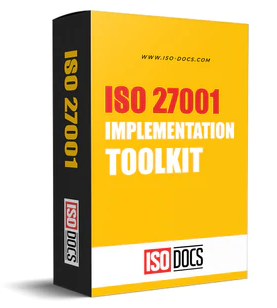How Long Does ISO 27001 Certification Take
In today's rapidly evolving digital landscape, safeguarding sensitive information has become a paramount concern for organizations across diverse industries. The ISO 27001 certification, renowned globally as the standard for Information Security Management Systems (ISMS), offers a structured framework to establish robust security practices and protocols.

As companies endeavor to fortify their cybersecurity measures and enhance their resilience against threats, the pursuit of ISO 27001 certification emerges as a strategic imperative. However, the duration of the certification process is influenced by a multitude of factors. In this comprehensive 2000-word guide, we delve into the intricacies of ISO 27001 certification, exploring the key elements that impact the timeline and providing insights into how organizations can streamline the journey to achieving this prestigious accreditation.
Understanding ISO 27001 Certification: A Brief Overview
Before embarking on the journey to ISO 27001 certification, it's essential to grasp the essence of this internationally recognized standard. ISO 27001 doesn't merely prescribe a checklist of security measures; it presents a holistic philosophy for safeguarding information in an interconnected world. The standard outlines the requirements for creating a robust ISMS, encompassing policies, processes, and controls that collectively ensure the confidentiality, integrity, and availability of sensitive data.
Factors Affecting Certification Duration
The timeline for ISO 27001 certification is influenced by various organizational factors. Let's explore some of the key determinants that can impact the duration of the certification process:
- Organizational Size and Complexity: The Impact of ScaleThe size and complexity of an organization significantly influence the certification timeline. Larger organizations with intricate IT infrastructures, multiple departments, and global operations may require more time to implement and document the necessary security controls.
- Current State of Information Security: Leveraging Existing Foundations Organizations that already have a well-established information security framework may experience a shorter certification process. Existing security policies and practices can be aligned with ISO 27001 requirements, reducing the time needed for implementation.
- Commitment and Resources: The Driving Force of DedicationThe level of commitment and resources allocated to the certification process plays a pivotal role in its duration. Organizations that dedicate sufficient personnel, budget, and time to the project are more likely to complete the process efficiently.
- Documentation and Implementation: Building the FrameworkCentral to ISO 27001 certification is the creation and implementation of comprehensive documentation, including policies, procedures, and controls. The time required for drafting, reviewing, and finalizing these documents can vary based on internal processes and the complexity of the information security landscape.
- Employee Training and Awareness: Empowering the Human ShieldEnsuring that employees are well-informed about the importance of information security and their roles in maintaining it is critical. The duration of certification can be impacted by the time needed to conduct training sessions and raise awareness among staff members.
- Risk Assessment and Treatment: Navigating the Risk Landscape Conducting a thorough risk assessment is a fundamental step in ISO 27001 implementation. Identifying vulnerabilities and defining appropriate risk treatment strategies can extend the certification timeline, especially if extensive remediation efforts are required.
- Internal Audits and Reviews: Ensuring Continuous ComplianceRegular internal audits and reviews are necessary to ensure that the organization's ISMS is effectively implemented and maintained. These audits can consume time, especially if corrective actions are identified and need to be addressed.
- External Audit Engagement: The Culmination of EffortsThe external audit, performed by a certified ISO 27001 auditor, is the final step before obtaining certification. Scheduling the audit and aligning it with the auditor's availability can impact the overall timeline.
Streamlining the Certification Process
While the certification timeline may vary, organizations can take strategic steps to optimize the ISO 27001 certification process. Implementing these strategies can help expedite the journey and enhance the effectiveness of the certification efforts:

- Effective Project Management: Guiding the Path to Certification Adopt a structured project management approach to ensure tasks are assigned, deadlines are met, and progress is monitored. A well-managed project minimizes delays and ensures the certification process stays on track.
- Clear Communication: Nurturing Collaboration and Clarity Maintain open and transparent communication among stakeholders involved in the certification process. Clear communication ensures everyone understands their roles and responsibilities, reducing misunderstandings and potential roadblocks.
- Leveraging Existing Resources: Building Upon a Strong FoundationIf the organization already has information security policies or practices in place, leverage these resources as a foundation for ISO 27001 implementation. This can significantly reduce the time needed to create new documentation and align existing practices with ISO 27001 requirements.
- Automate and Digitize: Harnessing Technology for EfficiencyUtilize technology to streamline documentation processes, track progress, and manage information security controls. Automation can enhance efficiency, reduce manual effort, and facilitate real-time monitoring.
- Conduct Pre-Assessments: Proactively Addressing GapsBefore the official external audit, consider conducting pre-assessments or mock audits to identify gaps or non-conformities. This proactive approach allows you to address issues beforehand and be better prepared for the final audit.
Conclusion
ISO 27001 certification is not just a badge of honor; it's a strategic investment in safeguarding sensitive information and upholding robust information security practices. While the certification process duration can vary based on organizational factors, careful planning, resource allocation, and effective management can streamline the journey. By understanding the key factors that influence the timeline and adopting strategic approaches, organizations can navigate the ISO 27001 certification path efficiently and effectively. As you embark on this journey towards information security excellence, remember that the commitment to securing valuable data isn't just a requirement it's a mission to fortify your digital future.


